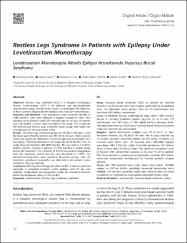Restless Legs Syndrome in Patients with Epilepsy Under Levetiracetam Monotherapy

Göster/
Tarih
2018Yazar
Kutlu, GülnihalGenç, Fatma
Ünal, Yasemin
Öztürk, Dilek Aslan
Erdal, Abidin
Gömceli, Yasemin Biçer
Üst veri
Tüm öğe kaydını gösterÖzet
Objective: Restless Legs syndrome (RLS) is a frequent neurological disease. Levetiracetam (LEV) is an effective and broad-spectrum anticonvulsant drug. The aim of this study is to investigate the frequency of RLS in patients diagnosed with epilepsy who took LEV monotherapy. Materials and Methods: Two neurologists were reviewed the files of 1680 patients, who were followed in epilepsy outpatient clinic. One hundred seven patients under LEV monotherapy for at least six months and 120 healthy controls were included in the study. The criteria for the International Restless Legs Syndrome Study Group were taken into consideration for the assessment of RLS. Results: The mean age of patient group was 38.26 +/- 17.39 years, while the mean age of healthy controls was 39.17 +/- 16.12 years. There were no statistically significant differences in terms of age and sex between each two groups. The mean duration of LEV usage was 28.34 months. The LEV usage dose was between 500-3000 mg/day. RLS was seen in 7 (5.83%) healthy controls, whereas 4 patients (3.73%) had RLS in patient group before LEV treatment. The symptom of RLS in two patients disappeared after LEV treatment started and this rate decreased to 1.87%. The biochemical parameters were normal in all patient groups, after LEV treatment, peripheral neuropathy was detected in one patient whose symptoms were not relieved. Conclusion: LEV may have therapeutic effect on RLS. It may be preferred especially in comorbid situations where epilepsy and RLS are seen together. Longitudinal and prospective studies are needed to manifest better the therapeutic effects of LEV on RLS.

















